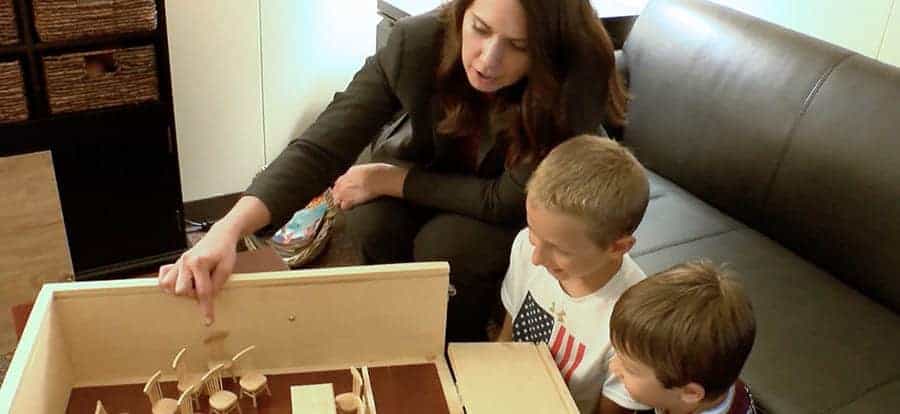You can imagine how much stress, trauma, and emotion that passes through a child’s mind and body after an incident of abuse. But for many children, the hardest part can come months or years later in a courtroom.
Defendants in child abuse and neglect cases have a Sixth Amendment right to face their accused in court. A recent Court of Appeals decision allowing the use of pre-recorded forensic interviews from CACs as official testimony in court remains to change the way the judiciary hears from young victims.
In the meantime, children old enough to speak clearly are expected to testify about what allegedly happened to them. Fears of “being wrong”, sending someone to jail, living with guilt, and not understanding the way the courtroom feels and works adds to an experience that can shut some children down. Jess Powers, Director of Media Relations and a criminal investigator for the Vanderburgh County Prosecutor’s Office says, “Everything we’ve ever done prior to court has been all that we can with limited time, conflicting schedules, and an overload of cases.”
For most courts and Prosecutor’s offices, that’s little to no time at all spent with children before walking before the judge and jury. Prosecutor Nick Hermann had wanted to experiment with findings from a study from the University of Las Vegas School of Law that showed court modeling – with an actual scale model of a court room – helped reduce stress and anxiety. The program is called “Kids Court”.
“Young victims didn’t ask to be thrust into the criminal justice system,” explains Vanderburgh County Prosecutor Nick Hermann. “Our job is to stand up for them and help be their voice in this process. Anything we can do to make this difficult situation a little easier, we are going to try to accomplish.”
The program involves showing children, sometimes as young as five years old, a model of the courtroom. A staff person, typically from the Prosecutor’s office, talks to the child about the players in the court room. “We’re trying to help increase their confidence, to help them look people in the eye, and tell their story clearly,” says Powers.

Children also have the opportunity to visit the courtroom along with their families when it’s not in use. Children can see the room, sit in the jury box, identify where the judge sits, and ask questions for as long as it takes them to become comfortable.
As Powers explained, “Prosecutor Herman and our Deputy Prosecutor, Kelly Corne, both were thinking about this. Kelly handles most crimes against children cases, and Nick had this idea in the back of his mind for a while. Kelly, who came from another county, was trying to start this there. This made for the perfect partnership. Law students ran the program at UNLV, but we thought we could recreate it on a smaller scale for specific cases here.” Rebecca Nathanson, the lead researcher at UNLV behind the court modeling and preparation study sent along their findings.
“Of course, some kids don’t have much change, but a majority of children who do this have a better understanding of the court process, more confidence, lower heart rate, clearer language and testimony, and their story is more consistent,” says Powers.
For court personnel and the Prosecutor’s Office, they hope this is the sort of program you never hear much about. “The goal of this program would be to help kids through this difficult part of their lives. When the case is complete, we hope our different programs will help children move on. If we can get this right, we may see more kids thanking us, especially if the perpetrator went away for a longer period of time because we could use their testimony more effectively,” says Powers.
Vanderburgh County courtrooms also have special help from Finn, a therapy service dog that helps break down barriers with kids who are particularly challenging to make relationships. “There are cases where a victim is just shy, and we work with them in Kids Court, with our specialty therapy dog Finn, and with experts at victim advocacy center Holly’s House. Hopefully with all those different options, we can better reach those kids,” says Powers.
Parents and guardians preparing a child for court can help in advance of their court date, too. The Kids Court model helps children understand the process, but there’s more effort involved in communication skills. “If we’re working with a child and they always look at the floor or their shoes, help remind them to look up,” says Powers. She also recommends families help children maintain eye contact in everyday conversations, stay focused without going off on tangents, and not to feel afraid of anyone in the courtroom.
Powers says you can give kids the same amount of information as an adult, but tell them in a way that’s age-appropriate. “We’ve had kids that desperately want to testify. They want to tell their story, and they want to move forward. When they know what’s going on, they understand the importance of their role,” says Powers.
